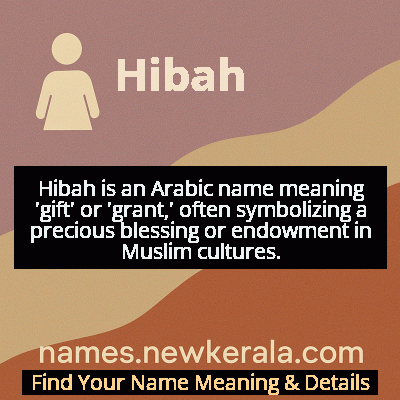Hibah Name Meaning & Details
Origin, Popularity, Numerology Analysis & Name Meaning of Hibah
Discover the origin, meaning, and cultural significance of the name HIBAH. Delve into its historical roots and explore the lasting impact it has had on communities and traditions.
Name
Hibah
Gender
Female
Origin
Muslim
Lucky Number
1
Meaning of the Name - Hibah
Hibah is an Arabic name meaning 'gift' or 'grant,' often symbolizing a precious blessing or endowment in Muslim cultures.
Hibah - Complete Numerology Analysis
Your Numerology Number
Based on Pythagorean Numerology System
Ruling Planet
Sun
Positive Nature
Leaders, ambitious, highly driven, self-reliant, innovative.
Negative Traits
Overly aggressive, domineering, impatient, selfish.
Lucky Colours
Red, orange, gold.
Lucky Days
Sunday.
Lucky Stones
Ruby, garnet.
Harmony Numbers
2, 3, 9.
Best Suited Professions
Entrepreneurs, managers, engineers.
What People Like About You
Courage, determination, leadership.
Famous People Named Hibah
Hibah Al-Mansour
Filmmaker
Pioneering Saudi female director who broke gender barriers in Middle Eastern cinema
Hibah Al-Khathlan
Academic and Activist
Influential voice in Saudi women's education reform and social development
Hibah Khan
Journalist
Internationally recognized for human rights reporting and conflict zone journalism
Hibah Noor
Entrepreneur
Successfully built an eco-friendly fashion empire while empowering female artisans
Name Variations & International Equivalents
Click on blue names to explore their detailed meanings. Gray names with will be available soon.
Cultural & Historical Significance
The name also represents a significant shift in cultural attitudes toward female children in pre-Islamic Arabia. Where female infanticide was once practiced, Islam emphasized the value of daughters as blessings, making names like Hibah symbolic of this transformation. In contemporary Muslim societies, the name continues to represent hope, blessing, and the joyful acceptance of Allah's gifts. The cultural significance extends to Islamic legal traditions where 'hibah' refers to a specific type of gift transfer, adding layers of meaning related to commitment, responsibility, and formal recognition of relationships.
Extended Personality Analysis
Women named Hibah typically develop personality traits that reflect their name's meaning of 'gift.' They often exhibit exceptional generosity, not just in material terms but through emotional support, time, and attention to others' needs. This innate giving nature makes them cherished friends and family members who naturally uplift those around them. Hibahs tend to be emotionally intelligent and perceptive, able to sense when others need support and providing it with genuine warmth and compassion.
Their personality often includes strong diplomatic skills and a preference for harmony, making them excellent mediators in conflicts. Many Hibahs develop creative talents and artistic sensibilities, expressing their inner beauty through various forms of art, writing, or music. They typically possess strong intuition and empathy, allowing them to form deep, meaningful connections with diverse people. While gentle in nature, Hibahs often demonstrate quiet strength and resilience when facing challenges, viewing obstacles as opportunities for growth. Their overall demeanor tends to be calming and nurturing, creating safe spaces where others feel valued and understood.
Modern Usage & Popularity
In modern contexts, Hibah maintains its cultural relevance while adapting to contemporary naming trends. The name enjoys consistent popularity in Muslim-majority countries like Saudi Arabia, UAE, Pakistan, and Malaysia, where parents value its beautiful meaning and Islamic significance. Among diaspora communities in Western countries, Hibah serves as a meaningful connection to cultural heritage while being easily pronounceable in English-speaking environments. Recent years have seen a slight increase in the name's usage as part of a broader trend toward choosing names with positive meanings and spiritual depth. Social media platforms have helped maintain the name's visibility, with many young Hibahs building personal brands that emphasize generosity, creativity, and community service—thus reinforcing the name's positive associations. While not trending dramatically upward, Hibah maintains a stable presence in baby name registries, appealing to parents seeking a name that balances tradition with contemporary relevance and carries universally appreciated positive qualities.
Symbolic & Spiritual Meanings
The symbolic meaning of Hibah extends far beyond its literal translation as 'gift.' It represents the fundamental Islamic concept that every blessing in life—from relationships and opportunities to personal talents and daily provisions—is ultimately a gift from Allah. This perspective encourages gratitude and recognition of divine generosity in all aspects of existence. Symbolically, Hibah embodies the idea that human beings themselves are gifts to each other and to the world, each possessing unique qualities that enrich collective human experience.
Metaphorically, the name suggests that the most valuable gifts are often intangible: love, wisdom, compassion, and time. It represents the cyclical nature of giving and receiving that sustains healthy communities and relationships. In spiritual contexts, Hibah symbolizes the unexpected blessings that arrive precisely when needed, reminding us of divine timing and providence. The name also carries the symbolic weight of responsibility—recognizing that gifts (whether material, talents, or relationships) come with the duty to use them wisely and share them generously. This multi-layered symbolism makes Hibah a name that continually inspires reflection on the nature of blessings, gratitude, and our interconnected human journey.

